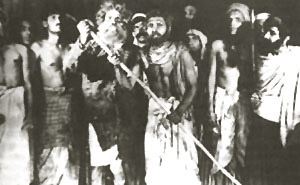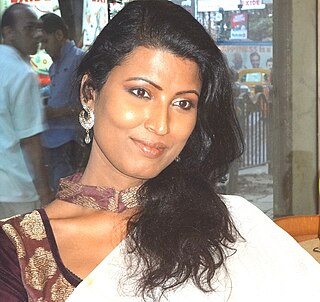Plot
This article needs an improved plot summary.(December 2012) |
Inspired by George Orwell's Animal Farm the drama was a satire and criticised the communist regime of West Bengal.
Poshu Khamar (first staged in 2006) is a political Bengali drama produced by the theatre group Pancham Baidik and directed by Arpita Ghosh. The drama was Bengali adaptation of George Orwell's Animal Farm . Political administration attempted to ban the staging of this drama because of its political sensitivity and the upcoming election. [1] [2] [3]
This article needs an improved plot summary.(December 2012) |
Inspired by George Orwell's Animal Farm the drama was a satire and criticised the communist regime of West Bengal.
Because of the political nature of the drama and the satirical comments targeting the Communist Party of India (Marxist), which was the ruling party of West Bengal at that moment, the staging of the play was attempted to be banned by state authority. On March 14, 2011 the drama was scheduled to be staged Bansberia in the Hooghly district. The show was to start at 6 pm but the theatre group received an order from district administration where they were asked to cancel the show. Armed local police force with the directive of the additional district magistrate went there to stop the staging of the drama. They cited the violation of the code of conduct ahead of the upcoming election as the reason to stop the staging of the drama. [1] [2] [4]
This action of political administration was criticised by state's intellectuals, theatre artistes and students' organisation. Theatre artistes, students gathered in front of the Academy of Fine Arts and showed their protest. Theatre personality Bibhas Chakraborty told– [2] "During the Singur and Nandigram episode, many plays that criticised the state government's decision, were stopped from being staged. Despite repeated requests, the chief minister did not initiate any step at that time"

Utpal Dutt was an Indian actor, director, and writer-playwright. He was primarily an actor in Bengali theatre, where he became a pioneering figure in Modern Indian theatre, when he founded the "Little Theatre Group" in 1949. This group enacted many English, Shakespearean and Brecht plays, in a period now known as the "Epic theatre" period, before it immersed itself completely in highly political and radical theatre. His plays became an apt vehicle for the expression of his Marxist ideologies, visible in socio-political plays such as Kallol (1965), Manusher Adhikar, Louha Manob (1964), Tiner Toloar and Maha-Bidroha. He also acted in over 100 Bengali and Hindi films in a career spanning 40 years, and remains most known for his roles in films such as Mrinal Sen’s Bhuvan Shome (1969), Satyajit Ray’s Agantuk (1991), Gautam Ghose’s Padma Nadir Majhi (1992) and Hrishikesh Mukherjee's breezy Hindi comedies such as Gol Maal (1979) and Rang Birangi (1983). He also did the role of a sculptor, Sir Digindra Narayan, in the episode Seemant Heera of Byomkesh Bakshi on Doordarshan in 1993, shortly before his death.

Mamata Banerjee is an Indian politician who is serving as the eighth and current chief minister of the Indian state of West Bengal since 20 May 2011, the first woman to hold the office. Having served multiple times as a Union Cabinet Minister, Mamata Banerjee became the Chief Minister of West Bengal for the first time in 2011. She founded the All India Trinamool Congress in 1998 after separating from the Indian National Congress, and became its second chairperson later in 2001. She is often referred to as Didi.

The culture of Kolkata concerns the music, art, museums, festivals, and lifestyle within Kolkata. It is the former capital of India and, as of 2021, the capital of the Indian state of West Bengal. Geir Heierstad writes that Bengalis tend to have a special appreciation for art and literature.

Indian People's Theatre Association (IPTA) is the oldest association of theatre-artists in India. IPTA was formed in 1943 during the British rule in India, and promoted themes related to the Indian freedom struggle. Its goal was to bring cultural awakening among the people of India.

Bengali theatre primarily refers to theatre performed in the Bengali language. Bengali theatre is produced mainly in West Bengal, and in Bangladesh. The term may also refer to some Hindi theatres which are accepted by the Bengali people.

Tista Das or Teesta Das is an Indian transgender rights activist, actress and writer from the Indian state of West Bengal. She has acted in several Hindi and Bengali films.

Prosenjit Chatterjee is an Indian actor and producer. He is widely regarded as one of the leading actors in modern Bengali cinema. He predominantly works in Bengali cinema. He is the son of veteran Bollywood actor Biswajit Chatterjee. He began his acting career as a child actor in Hrishikesh Mukherjee's Chotto Jigyasa, for which he won the Bengal Film Journalists' Association – Most Outstanding Work of the Year Award. Following this he appeared in other films as a child actor. But unable to concentrate on his studies, Prosenjit took a break from acting and returned after completing his graduation from Xavier's University and his first leading role came through Bimal Roy's Duti Pata.

Gerasim Stepanovich Lebedev, also spelled Herasim Steppanovich Lebedeff, was a Russian adventurer, linguist, pioneer of Bengali theatre, translator, musician and writer. He was a pioneer of Indology.

Utsab is a 2000 Bengali-language drama film directed by Rituparno Ghosh and stars Madhabi Mukherjee, Mamata Shankar, Rituparna Sengupta, Prasenjit Chatterjee, Pradip Mukherjee, Deepankar De and Arpita Pal. The film focuses on the various emotional currents passing among family and relatives underneath the supposedly festive occasion of Durga Puja.
Koushik Sen is an Indian actor in film, television and theatre, based in Kolkata. He is the director of the theatre group Swapnasandhani. He won a Bengal Film Journalists' Association Award for best supporting actor for his performance in the Mrinal Sen directed film Aamar Bhuvan. He was awarded Girish Purashkar 2023 by the Cultural Department of the Government of West Bengal for his extraordinary contributions to theatre. This year he was also awarded Telly Academy Best Actor Award for Godhuli Alap series.

Bratyabrata Basu Roy Chowdhury, also known as Bratya Basu, is an Indian actor, stage director, playwright, film director, professor and politician who has been the Education Minister of West Bengal since 2021. He has also assumed the same office in the First Mamata Banerjee ministry. In May 2016, Basu was assigned the portfolios of Tourism, Science Technology and Bio-Technology, Information Technology and Electronics. He has been elected as a Member of the Legislative Assembly, from the Dum Dum constituency since the 2011 Assembly Election of West Bengal. Basu is presently the Chairperson of Paschimbanga Bangla Akademi and Minerva Natyasanskriti Charchakendra under the governance of the Department of Information and Cultural Affairs, West Bengal.

The Dramatic Performances Act was implemented by the British Government in India in the year 1876 to police seditious Indian theatre. India, being a colony of the British Empire had begun using the theatre as a tool of protest against the oppressive nature of the colonial rule. In order to check these revolutionary impulses, the British Government proceeded to impose the Dramatic Performances Act. Following India's independence in 1947, the Act has not been repealed, and most states have introduced their own modified versions with certain amendments which have in fact, often strengthened the control of the administration over the theatre.

The group theatre of Kolkata refers to a tradition in theatres in the Indian city Kolkata, which developed in the 1940s as an alternative to entertainment-oriented theatres. As opposed to commercial theatres, group theatre is "a theatre that is not professional or commercial", characterized by its tendency for experimentation in theme, content and production, and its aim of using the proscenium stage to highlight social messages, rather than having primarily making-money objectives.

Shaoli Mitra [alternatively spelt as Shaonli Mitra ; c. 1948 – 16 January 2022) was an Indian Bengali theatre and film actress, director, and playwright. She played the role of Bangabala in Ritwik Ghatak's Jukti Takko Aar Gappo. She is the daughter of Sombhu Mitra and Tripti Mitra, who were also theatre personalities.
Kumar Roy (1926–2010) was a Bengali theatre actor, director and playwright. In 1983 he won the Sangeet Natak Akademi Award. He was associated with the group Bohurupee. In 1989 he directed the re-creation of the classic play Nabanna (1948). He was the President of the PashchimBanga Natya Akademi from 2006 till his death in 2010. Kumar Roy was also Professor of Drama at Rabindra Bharati University, Kolkata and Visiting Professor at Sangeet Bhavan, Visva-Bharati, Santiniketan.

Ma Mati Manush is a Bengali political slogan, coined by All India Trinamool Congress chief and current Chief Minister of West Bengal Mamata Banerjee. The term is translated as "Mother, Land, and People". It became very popular in West Bengal during the 2009 General election and 2011 state assembly election. The slogan was widely used by the political party in almost all of their political and election campaigns.

Arpita Ghosh, is an Indian theatre artist and politician who serves as a Member of Parliament, Rajya Sabha from West Bengal. She has served as the Member of Parliament of the 16th Lok Sabha for Balurghat, West Bengal. She won the 2014 Indian general election being an All India Trinamool Congress candidate.
Sujan Mukherjee is an Indian actor who works in Bengali language films, television and theatre. In 2012 he made his directorial debut with the film Ghete Gho. He is an active Member of the renowned Theatre Group Chetana. On 22 February 2016 his directorial debut, in the field of Theatre, Ghashiram Kotwal, which is an adaptation on Marathi play, was premiered. In 2018 he directed Don: Taake Bhalo Laage an adaptation of Dale Wasserman's Don Quixote which was translated into Bengali by Arun Mukhopadhyay many years back. This play marked the re-entry of Suman Mukhopadhyay as an actor after 25 years.
Dilip Bagchi was a Bengali mass singer, educationist and political activist. He was an active member of Indian People's Theatre Association of West Bengal.
Shatarup Ghosh is an Indian politician from West Bengal belonging to Communist Party of India (Marxist) (CPIM). He had formerly served as the All India Joint Secretary of Students' Federation of India (SFI), the students wing of CPIM and was member of its central secretariat. Then he became a member of the state committee secretariat of Democratic Youth Federation of India (DYFI), which is the youth wing of CPIM. He was also inducted into West Bengal state committee of CPIM in the 23rd Party conference of state in March 2022 and currently a member of it.